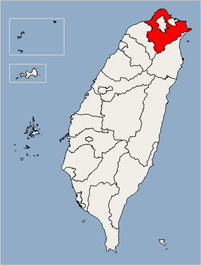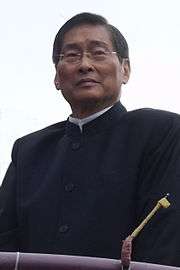Bamboo Union
| Founded | 1950s |
|---|---|
| Founder | Chen Chi-Li "King Duck" |
| Founding location | Taiwan |
| Years active | 1950s-present |
| Territory | Taiwan, United States, Britain, Australia, and France |
| Ethnicity | Taiwanese |
| Membership | 10,000 members (2007) |
| Leader(s) | Chang An-Lo "White Wolf" |
| Criminal activities | Drug trafficking, kidnapping, extortion, espionage, Protection racket, contract killing, assault, assassinations, illegal gambling, loan sharking, political corruption, human trafficking, prostitution, murder, and organized crime |
The United Bamboo Gang also known as UBG (Chinese: 竹聯幫; pinyin: Zhūliánbāng) is the largest of Taiwan's three main criminal Triads.[1][2][3] They are reported to have roughly 10,000 members.[1][3][4][5] The membership consists largely of waishengren (Mainland Chinese) and has had historic ties to the Kuomintang; they are said to be motivated as much by political ideology as by profit. They are known to simply call themselves "businessmen", but in reality, are also involved in organized killings, drug trafficking, and sex trafficking, among others. The gang gained global notoriety when it became directly involved in politics in the early 1980s. The union does not view themselves as criminals, but instead they view themselves as patriots.
History
The Bamboo Union was formed in the 1950s by Waishengren ("mainland Chinese") children who wanted to protect themselves from threats by Hoklo children. The first members lived on Bamboo Forest Road in Jung Ho City, Taipei County, now Zhonghe District of New Taipei City.[6] Its first members were made up of mainland Chinese teens who joined together to secure a place in the province of Taiwan (Taiwan was the seat of the Republic of China government which held claims on mainland China, which was under the control of the Communist government) in which they were an unwelcome minority that was rejected by Hoklo citizens. Their criminal gang began primarily with street-fighting to gain recognition in society. By the late 1960s, the aspirations of the Bamboo Union membership shifted from street-fighting to profiteering. The gang began making a name for itself in the "protection" business and extorting money from local shops and factories, but the gang's treasury overflowed when thousands of well-paid American GIs flocked to Taipei while on R&R from the Vietnam War.[7] Chinese nightclub owners welcomed Bamboo Union members to their premises to banish rival gangs of ethnic Taiwanese trying to carve out a share of the lucrative trade in gambling, prostitution, and drugs.[7] By this stage, the Bamboo Union was fast developing into a transnational crime syndicate or "triad". For example, current leader Chang An-lo, known as "White Wolf," moved to Las Vegas in 1968 to study and keep order of the Bamboo Union's expanding empire, particularly in the Chinatowns of California and the gambling halls of Las Vegas.[7] In the early 1980s, the gang became even more powerful when they joined hands with the "Iron Blood Patriots" to carry out missions overseas. In return, both gangs were offered a great share of the heroin trade that expanded into the world market. This deal made the Bamboo Union very powerful in Taiwanese politics and social culture, but they were also being watched by major countries like the United States. The gang's powerful relationship with the "Iron Blood Patriots" came to an end when Henry Liu was murdered on 15 October 1984.[7]


Historical leadership
Boss (official and acting)

- 1976-1995 — "King Duck" Chen Chi-li[8]
- 1995–present — "White Wolf" Chang An-Lo[8]
Co-Conspirators
- 1956–65 — Chao Ning
- 1965-1972 — "Master Yang" Yang Chien-pin
- 1972-1976 — "King Chou" Chou Jung
- 1995-1999 — "Yao Yao" Huang Shao-tsen
- Acting 2001-2007 — "King Chao" Chao Erh-wen
- Acting 2002-2006 — "Zhong Kui" Li Tsung-kuei
- Acting 2006-2009 — "Monkey King" Hu Tai-fu
- Return 2010–present — "Yao Yao" Huang Shao-tsen
Death of Chen Chi-Li
One of the most significant events that have taken place in the Bamboo Union's legacy was the death of their former leader Chen Chi-Li. The former leader had a very complicated relationship with between criminal organization and the Chinese Nationalist (KMT) regime.[9] He died of cancer and his funeral brought more than 10,000 mourners.[10] His mourners included a number of politicians from Taiwan's still-young democracy which has struggled to shrug off long-standing links to the criminal underworld. Fellow gangsters said that Chen did not understand why the government would treat a patriot like him as a criminal. He was not a normal gangster, but an idealist who had made money do the right thing.[9] Representatives of Taiwan's three main criminal organizations, the Bamboo Union, the Four Seas Triad and the Celestial Way, were on hand to pay their respects to Mr. Li.[11] Members of Japan's feared yakuza, dressed in black suits, were also among the guests, while representatives from crime families of Hong Kong, Macau, Malaysia and Thailand also joined the procession under the watchful gaze of thousands of police.[11] More than 1,000 police officers were assigned to monitor and videotape the movements of the mourners, a number of whom are 'big brothers' of local gangs.The family spent NT$2 million (HK$475,000) to charter a China Airlines Airbus plane to transport the body, plus friends and relatives to Taiwan.[12] According to local news media, the family was spending at least NT$20 million to make sure Chen's funeral was held in grand style.[12]
Illegal Activities
On account of the mainland origins of its membership, the Bamboo Union developed close links with military intelligence and security agencies. They participate in many illegal activities like security services, debt collection, loan sharking, gambling dens, hostess clubs, restaurants, small businesses. It is known internationally for drug smuggling, human trafficking, and silencing journalists as far away as Northern California. Besides these activities, their most noted illegal activity is "organized crime". Anyone who is capable of reimbursing the gang's services is able to get this work done. Since their work is so noted, they have become the most powerful gang in Taiwan. They have a large role in all types of illegal activities.
Notable Cases
In 1980, the daughters and mother-in-law of one of the leading members of the opposition, Liu I-liang, were brutally killed in their home. The following year, Ch'en Wen-ch'eng, a Taiwanese academic based at an American university was killed and his body dumped in the grounds of one of Taiwan's top universities. Also in 1984, Henry Liu was a dissident who had written a critical biography of Chiang Ching-kuo. He was assassinated by members of the Bamboo Union who were subsequently caught and convicted by the police.[13] His murderers, one being "Dry Duck", were sentenced to life in prison. In July 2009, Chinese Bamboo Union hitman Bai Xiao Ye stabbed and slashed a man to death in a Las Vegas, Nevada karaoke bar and wounded two others. In 2013, Bai was sentenced to life imprisonment without parole. Bai had also been charged with fatally shooting a man and wounding another at a Los Angeles karaoke bar.[14] In October 2015, the Bamboo Union struck again and had one of their most notorious cases as they were linked to the kidnapping of Hong Kong businessman Wong Yuk-kwan.[15]
Organization
Unlike Japan's yakuza or Italy's mafia, the United Bamboo does not have a strict rank-and-file. Twenty-four members are each led by a big brother or "da ge" with membership comprising gangland enforcers and individual businessmen.[16] Due to its structure United Bamboo and its activities usually fly below the radar. Mutual benefits and obligations underpin the relationships within the gang, as members who may not do business with one another will turn to one another in times of crisis. All members pay homage to Chang, who was "recognized" by Taiwan's triads as their "opinion leader" in 1995 and is held in such esteem that businessmen ask him to help settle disputes.[17] The gang has a "code of ethics" that has ten rules that all members must follow.[18] The mainland branch of the Bamboo Union is disciplined and well organized, complete with rank systems, promotions, and benefits. Senior gang figures are given the honorific suffix "Da Ge", or "Big Brother".
According to the junior Bamboo Union "boss" Big Brother Hsu, the gang is divided into approximately 13 divisions, or tang kou, with names such as "Tiger Division" and "Dragon Division". Within those 13 divisions, there are 68 branches of members.
See also
References
- 1 2 Bishop, Mac William (4 June 2005). "Taiwan's gangs go global". Asia Times. Retrieved 5 April 2014.
- ↑ Simon, Sheldon W. (21 August 2001). The Many Faces of Asian Security. Rowman & Littlefield Publishers. p. 204. ISBN 9781461608387.
- 1 2 Kaplan, David E.; Dubro, Alec (20 May 2012). Yakuza. University of California Press. pp. 260–261. ISBN 9780520953819.
- ↑ "The List: The World's Most Dangerous Gangs", Foreign Policy, 2008-05-08, retrieved 2010-04-21
- ↑ Huang, Hua-Lun (2007). From the Asian Boyz to the Zhu Lian Bang (the Bamboo Union Gang): A Typological Analysis of Delinquent Asian Gangs. Lafayette, USA: Springer Netherlands. p. 129.
- ↑ Kyne, Phelim (2000). "Blood & drugs - a guide to the Bamboo Union". The Phnom Penh Post. Retrieved 3 April 2017.
- 1 2 3 4 Garnaut, John (12 July 2014). "Hungry like the wolf". The Sydney Morning Herald. Retrieved 3 April 2017.
- 1 2 "United Bamboo Gang". Geocities. 4 April 2017. Retrieved 4 April 2017.
- 1 2 Chang, Rich (22 October 2007). "The rise and fall of crime boss Chen Chi-Li". Taipei Times. Retrieved 4 April 2017.
- ↑ Liu, Ling (12 November 2007). "Death of a Triad Boss". Time. Retrieved 4 April 2017.
- 1 2 Foster, Peter (26 April 2010). "Gang leaders turn out for funeral of Taiwanese mafia boss". The Telagraph. Retrieved 4 April 2017.
- 1 2 Chung, Lawrence (19 October 2007). "Grand mafia-style funeral for boss of Taiwanese gang". South China Morning Post. Archived from the original on 2017-04-05. Retrieved 4 April 2017.
- ↑ Maguire, Keith (1997). "Modernisation and clean government: Tackling crime, corruption and organised crime in modern Taiwan". Netherlands: Kluwer Academic Publishers: 83. doi:10.1023/A:1008204328221.
- ↑ Lowther, William (7 March 2013). "US court sentences Bamboo Union gang hitman to life in jail". Taipei Times.
- ↑ "How Bamboo grew: 10,000-strong Taiwanese triad linked to Hong Kong executive's kidnapping is 'one of world's most dangerous gangs'". South China Morning Post. 29 October 2015. Archived from the original on 2015-10-30. Retrieved 29 March 2017.
- ↑ Cheng, Allen (1997). "Taiwan's Dirty Business". Retrieved 3 April 2017.
- ↑ Cheng, Allen (1997). "Taiwan's Dirty Business". Organized Crime Registry. Retrieved 3 April 2017.
- ↑ Mallory, Stephen L. (2011-07-28). Understanding Organized Crime. Jones & Bartlett Publishers. ISBN 9781449622572.